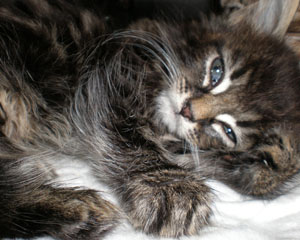31 December 2015
Animals are often particularly sensitive to noise, causing fireworks to be traumatic and distressing
As many see in the New Year with celebratory fireworks, the British Veterinary Association (BVA) is advising owners on how to make their home a safe haven for frightened pets when midnight strikes.
Firework noise can reach up to 150 decibels, as loud as a jet engine, and dogs, cats and other pets are often particularly sensitive to noise, causing New Year's Eve to be traumatic and distressing for animals. Luckily there are a few simple things that can be done around the house to prevent unnecessary stress for pets.
Five top tips for New Year's Eve:
- Create a den for your pet to hide in so they have a safe retreat when fireworks start going off
- Use pheromone products next to the den and around the home. These are scents that we can't smell but reduce a pet's stress.
- Provide background noise and close curtains and windows as the New Year's celebrations start.
- Remain calm yourself. Try not to reassure your pet as this often inadvertently reinforces anxious behaviour. Never punish your pet – remember, if they toilet in the house it's not their fault.
- Move small pets, such as rabbits and guinea pigs, to a quiet place indoors if fireworks are expected, and give lots of bedding to mask the sounds.
Sean Wensley, President of BVA, said:
“New Year's Eve is a time for celebration, but letting off fireworks when midnight strikes creates loud noises and bright flashes that a lot of animals find extremely frightening.
“As fireworks are being used more frequently now in the UK to mark festivities throughout the year, we encourage pet owners to visit their veterinary practice to discuss ways of keeping pets calm and reducing their stress, including measures that can be taken this evening to make your pets feel safer in their home.”
Some pets show obvious signs of distress, such as panting, drooling and attempts to escape, but there are also more subtle signs that owners should be aware of, including restlessness and toileting in the house. Cats often hide while rabbits may keep very still and thump the ground with their back feet.
If your pet is severely distressed by fireworks or other noises, BVA encourages pet owners to visit their vet to discuss treatment options. Firework phobia can be effectively treated with behaviour-modification techniques, which can achieve long-term success with professional input and owner commitment and patience.



